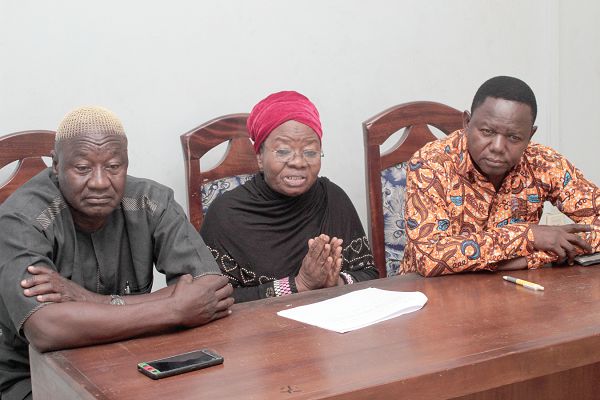
CSOs in agriculture commend Minister of Agriculture
Civil society organisations (CSOs) in the agricultural sector have called on the government to resource agriculture research institutions to empower them to produce improved seeds for farmers.
They said the solution to food insecurity in the country was to have improved seeds readily available and not to rely on the introduction of genetically modified seeds into the country.
Speaking on behalf of the Peasant Farmers Association of Ghana at a press briefing in Accra yesterday, the Executive Director of the association, Madam Victoria Adongo, applauded the Minister of Food and Agriculture, Dr Owusu Afriyie Akoto, for standing firm that Ghana did not need to introduce Genetically Modified Organisms (GMOs) into the country as a means to ensure food security.
Thank you Minister
"We are using this opportunity to acknowledge the minister for his stand and thank him for taking this position and making a public pronouncement that Ghana can do without GMO.
"We encourage him to hold on to this position as Ghanaian farmers, consumers and CSOs are in support of his position," Madam Adongo said.
The press briefing was organised jointly by three CSOs, namely the Peasant Farmers Association of Ghana (PFAG), General Agricultural Workers Union (GAWU) of the Trades Union Congress (TUC), Centre for Indigenous Knowledge and Organisational Development (CIKOD) and Food Sovereignty Ghana (FSG).
The meeting was called to commend the minister for his stance on GMOs and to pledge the CSOs’ support for him.
Challenges of farmers
Madam Adongo said agriculture research institutions, including the Savannah Agricultural Research Institute (SARI), The Crop Research Institute (CRI), the Grains Development and Legumes Board, among others, were poorly resourced and therefore could not provide enough foundation seeds for farmers.
Other challenges she identified that affected farmers in the country include limited irrigation facilities, poor transport and road network, storage facilities and difficulty in accessing credit from the banks.
She said these were critical and real challenges facing agriculture and farmers and obviously GMO was not the solution and could not be part of the solution at this stage of our agricultural development.
Implications of accepting GMOs
“We consider the call for the introduction of GMOs to salvage the local seed industry as a ploy and a grand strategy by multi-national seed companies and their Ghanaian agents to control seed production.
“Accepting GMOs in Ghana is not only contrary to Ghana’s development dreams as envisioned by President Nana Addo Dankwa Akufo-Addo, but it will further worsen the poverty level of smallholder farmers who will have to buy expensive seeds every year and will kill our infant seed industry as well as halt progress chalked up in the agricultural sector,” Madam Adongo said.
Health implications
With regard to health implications, she said, there was still an intense debate among scientists on the health consequences of using GMOs.
“As a nation, Ghana has no capacity, qualified personnel and adequate resources in place to monitor activities and research development and trends in the advent of GMOs.
“There is also the problem of conducting risk assessments and examining the full health, environmental and socio-economic implications of genetic engineering and GMOs in Ghana,” she said.
The General Secretary of GAWU, Mr Edward Kareweh, said introducing GMOs into the country would not only deprive the country of its food sovereignty but also lead to wiping out the country’s seed stock.
He said local farmers had a vast amount of ecological knowledge in traditional farming practices that had been applied in developing good seed varieties.
Mr Kareweh dismissed the assertion that CSOs in the country were prosecuting an agenda against international seed producing bodies, adding that if there was any agenda it was prosecuting, then it was in defence of farmers in the country.
